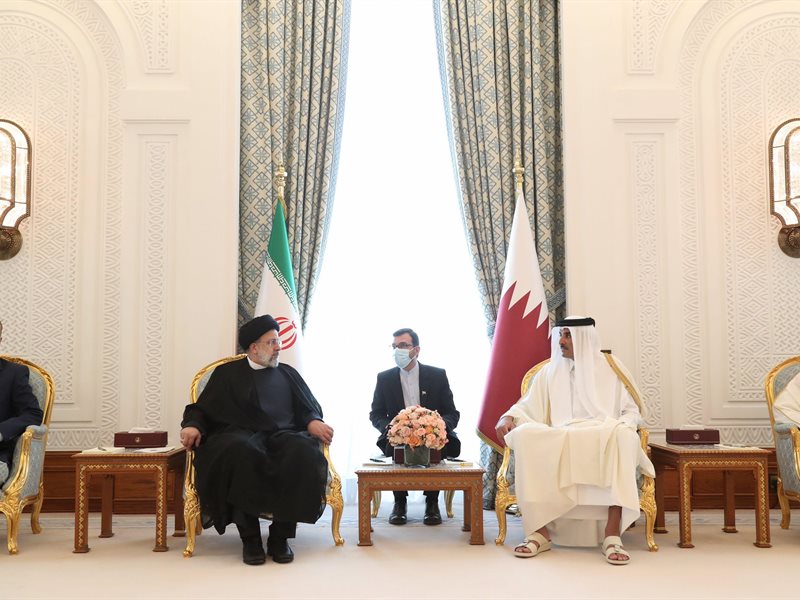 Qatar Emir Shaykh Tamim Bin Hamad Al Thani talks to Iranian President Ebrahim Raisi in Doha, Qatar, 21 February 2022. Source: Iranian Presidency via ZUMA Press Wire/Alamy
Qatar Emir Shaykh Tamim Bin Hamad Al Thani talks to Iranian President Ebrahim Raisi in Doha, Qatar, 21 February 2022. Source: Iranian Presidency via ZUMA Press Wire/Alamy
As part of the Global Transitions Series, the Middle East Centre has produced three papers on Emergent Powers in MENA, authored by Courtney Freer and Spyros A. Sofos. This series is a research output from PeaceRep – the Peace and Conflict Resolution Evidence Platform, funded by the UK Aid from the UK Foreign, Commonwealth & Development Office (FCDO).
MENA Regional Organisations in Peacemaking and Peacebuilding: The League of Arab States, Gulf Cooperation Council and Organisation of Islamic Cooperation by Courtney Freer.
This paper serves to highlight primary assets and challenges of three regional organisations in the MENA peacemaking/peacebuilding space: the League of Arab States, Gulf Cooperation Council and Organisation of Islamic Cooperation. The report seeks to interrogate the efficacy of these regional organisations in peacemaking/peacebuilding, ways in which their involvement in this sector differs from that of other regional or extra-regional bodies, the unique challenges facing the MENA region, and the best way for the FCDO to engage, either with these bodies or others, to enhance progress towards peace in a region that houses several ongoing political conflicts.
Qatar and the UAE in Peacemaking and Peacebuilding by Courtney Freer
This paper seeks to highlight ways in which Qatari and Emirati peacemaking/peacebuilding engagement is qualitatively different from other states’ or international organisations’ efforts in this sphere. The main questions explored were how Qatar and Emirati approaches to peacemaking/peacebuilding are unique, whether or to what extent their engagement has been useful to the resolution of conflicts, and how the FCDO can leverage these states’ interest in this sphere.
Peacebuilding in Turbulent Times: Turkey in MENA and Africa by Spyros A. Sofos
This paper, premised on an extensive review of relevant official documents from the Republic of Turkey’s Ministry of Foreign Affairs, the Presidency of Religious Affairs (DİYANET), the Turkish Cooperation and Coordination Agency (TİKA), analysis of media reports, as well as interviews with policymakers, diplomats and foreign policy, peacebuilding, and development experts assesses the Turkish political leadership and policy community’s understanding of peacebuilding, the contexts and main motivations underlying its conceptualisation and implementation, while outlining potential future developments.
About the Series: The Global Transitions Series looks at fragmentations in the global order and how these impact peace and transition settlements. It explores why and how different third-party actors – state, intergovernmental, and non-governmental – intervene in conflicts, and how they see themselves contributing to reduction of conflict and risks of conflict relapse. The series critically assesses the growth and diversification of global and regional responses to contemporary conflicts. It also asks how local actors are navigating this multiplicity of mediators and peacebuilders and how this is shaping conflict outcomes and post-conflict governance.
PeaceRep is a research consortium based at The University of Edinburgh. Our research is re-thinking peace and transition processes in the light of changing conflict dynamics, changing demands of inclusion, and changes in patterns of global intervention in conflict and peace/mediation/transition management processes.
Project Outputs
- Emergent Powers in MENA: Qatar, Turkey and Beyond, LSE Middle East Centre Event, April 2022. (Recording available)
-
MENA Regional Organisations in Peacemaking and Peacebuilding: The League of Arab States, Gulf Cooperation Council and Organisation of Islamic Cooperation, Courtney Freer. LSE Middle East Centre Paper Series 59, March 2022.
- Qatar and the UAE in Peacemaking and Peacebuilding, Courtney Freer. LSE Middle East Centre Paper Series 60, March 2022.
- Peacebuilding in Turbulent Times: Turkey in MENA and Africa, Spyros A. Sofos. LSE Middle East Centre Paper Series 61, March 2022.
Research Team
Dr Courtney Freer | Principal Investigator
Courtney is Provost’s Postdoctoral Fellow at Emory University in Atlanta, Georgia. Her research focuses on domestic politics of the Gulf, with particular interest in Islamism and tribalism.